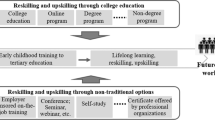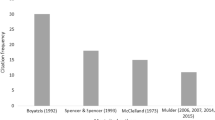Abstract
The organizational structures of public and local administration depend on many bureaucratic aspects. Emergencies and political factors instead of rational motivations related to knowledge, competences and profiles often influence the allocation of people in offices. In most cases, such situations generate dissatisfactions, low productivity and become gangrenous. The objective of this work is applying competence management, skill gap analysis and a study of the existing organizational structures to point out the functional unit with the most critical situation in terms of allocated employees in order to suggest the people to involve in learning programmes according to the complex laws, internal regulation for the staff management and trade-union influences. In fact, the proposed approach identifies the real gaps that create inefficiencies and suggests the employees to engage in learning activities by focusing exactly on what the organizations need with respect to what the employees have. It happens by elaborating a priority scale on the base of existing hierarchies, relationships, logistic constraints and other aspects with the aim, above all, of enhancing the identified unit and the local administration itself.












Similar content being viewed by others
References
Albertsen Thomas, Sandkuhl Kurt, Seigerroth Ulf, Tarasov Vladimir (2010) The practice of Competence modelling. The practice of enterprise modeling. Lecture notes in business information processing. Springer 68:106–120
Atdağ S, Vincent L (2013) A comparison of named entity recognition tools applied to biographical texts. Conference: 2nd International Conference on Systems and Computer Science (ICSCS). Villeneuve d’Ascq, France
Canada, Government of Key Leadership Competencies. Canada Public Service Agency and the Public Service Commission, 2007
Capuano N, Gaeta M, Mangione RG, Orciuoli F, Ritrovato P (2011) Integrating trust and competency management to improve learning. Proc. of 11th IEEE International Conference on Advanced Learning Technologies, pp 326–333. doi:10.1109/ICALT.2011.102
Capuano N, Iannone R, Gaeta M, Miranda S, Ritrovato P, Salerno S (2013) A recommender system for learning goals. Communications in Computer and Information Science 278:515–521
Capuano N, Longhi A, Toti D (2015) Ontology-driven generation of training paths in the legal domain. Int J Emerg Technol Learn 10:14–22
Chang C-S, Liu EZ-F, Sung H-Y, Lin C-H, Chen N-S, Cheng S-S (2014) Effects of online college student’s Internet self-efficacy on learning motivation and performance. Innov Edu Teach Int (Routledge) 51(4):366–377
Conteh C, Greitens TJ, Jesuit DK, Roberge I (2014) Governance and Public Management. Strategic Foundations for Volatile Times, Routledge
Del Nostro P, Gaeta AS, Paolozzi PR, Toti D (2013a) ARISTOTELE: an environment for managing knowledge-intensive enterprises. In: 21st Italian Symposium on Advanced Database Systems, SEBD 2013, pp 289–296
Del Nostro P, Orciuoli F, Paolozzi S, Ritrovato P, Toti D (2013b) A semantic-based architecture for managing knowledge-intensive organizations: the ARISTOTELE platform. Lect Notes Comput Sci 7652:133–146
Fishbein M, Ajzen I (1975) Belief, attitude, intention and behavior: An introduction to theory and research. Addison Wesley, Reading
Gaeta M, Miranda S, Ritrovato P (2008) ELeGI as enabling architecture for e-learning 2.0. Int J Knowl Learn 4(2–3):259–271
Gaeta M, Orciuoli F, Fenza G, Mangione GR, Ritrovato P (2012) A semantic approach for improving competence assessment in organizations. Proc. of ICALT 2012, pp 85–87
Gaeta M, Loia V, Mangione GR, Miranda S, Orciuoli F (2014) Unlocking serendipitous learning by means of social semantic web CSEDU 2014 - Proceedings of the 6th International Conference on Computer Supported Education, 1, pp. 285–292
Geron SM (2002) Cultural competency: how is it measured? Does it make a difference? Generations 26(3):39–45
Hartley J, Alford J, Hughes O, Yates S (2014) Public value and political astuteness in the work of public managers. The art of the possible. Wiley, New York
Henry NL (1974) Knowledge management: a new concern for public administration by the American. Public Administration Review 3
Kim P, Hong K (2005) Searching for effective HRM reform strategy in the public sector: critical review of WPSR 2005 and suggestions. Public Personnel Management 35(3):199–215
Lee C-S, Kao Y-F, Kuo Y-H, Wang M-H (2007) Automated ontology construction for unstructured text documents. Data Knowl Eng 60(3):547–566
Loia V, De Maio C, Fenza G, Orciuoli F, Senatore S (2010) An enhanced approach to improve enterprise competency management. In: 2010 IEEE international conference on fuzzy systems (FUZZ). IEEE, pp 1–8
Marzano Antonio, Notti Achille Maria (2015) Educational assessment: semantic representation and ontologies. JELKS, J E-Learn Knowl Soc 11(1):69–82
Miranda S, Mangione GR, Orciuoli F, Gaeta M, Loia V (2013) Automatic generation of assessment objects and Remedial Works for MOOCs. In: 2013 12th international conference on information technology based higher education and training (ITHET). pp1–8, Art No. 6671018. doi:10.1109/ITHET.2013.6671018
Miranda S, Orciuoli F, Sampson DG (2016) A SKOS-based framework for Subject Ontologies to improve learning experiences. Comput Hum Behav 61:609–621
Nostro PD, Orciuoli F, Paolozzi S, Ritrovato P, Toti D (2013) ARISTOTELE: a semantic-driven platform for enterprise management. Proceedings—27th International Conference on Advanced Information Networking and Applications Workshops, WAINA 2013. 44–49
Nunes F, Martins L, Duarte H (2007) Competency management in EU public administrations. EUPAN Human Resources Working Group
Rice MF (2007) A post-modern cultural competency framework for public administration and public service delivery. Int J Public Sector Manag 20(7):622–637
Rossi PG, Fedeli L (2015) Personalization, adaptivity, attunement. Journal of E-Learning and Knowledge Society 11(1):11–24
Suzuki LA, McRae MB, Short EI (2001) The facets of cultural competence: searching outside the box. The Counseling Psychologist 29(6):842–900
Tarassov V, Kurt S, Bengt H (2006) Using ontologies for representation of individual and enterprise competence models. Proc. of the Fourth IEEE International Conference on Computer Science, Research, Innovation and Vision for the Future, RIVF 2006. In: Bellot P, Duong V, Bui M (eds) Ho-Chi-Minh City, pp 205–212
Vakola M, Soderquist KE, Prastacos GP (2007) Competency management in support of organizational change. Int J Manpower 28(3/4):260–275
Weber M (1978) Economy and Society: An Outline of Interpretive Sociology. University of California Press
Wilson JP (2014) International human resource development: learning, education and training for individuals and organisations. Dev Learn Organ Int J 28(2)
Author information
Authors and Affiliations
Corresponding author
Rights and permissions
About this article
Cite this article
Gaeta, M., Marzano, A., Miranda, S. et al. The competence management to improve the learning engagement. J Ambient Intell Human Comput 8, 405–417 (2017). https://doi.org/10.1007/s12652-016-0399-7
Received:
Accepted:
Published:
Issue Date:
DOI: https://doi.org/10.1007/s12652-016-0399-7




